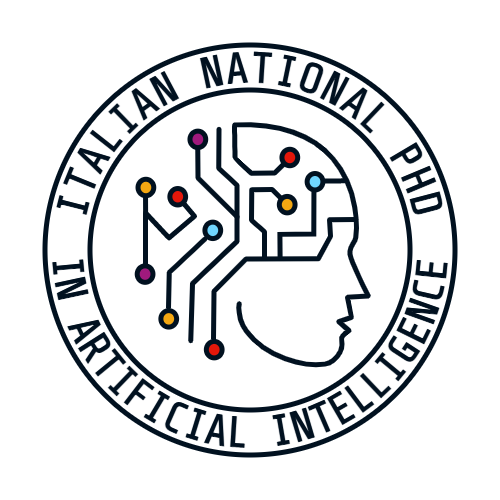Where: Pisa, Italy
When: 5th – 10th June 2025
The fourth edition of the “AI & Society Summer School”, organized by the Italian National PHD program in Artificial Intelligence, PhD-AI.it will take place in Pisa, Italy. The Summer School is dedicated to the PhD students of the “AI & Society” branch of PhD-AI.it, and open to PhD students of the other branches. Five thrilling days of lectures, panel and proactive project work, to advance the frontier of AI research together with internationally renown scientists. And plenty of social activities to mix up and build the community of next-generation AI researchers, innovators and professionals.
Partners
 |
 |
 |
|
| Italian National PhD in Artificial Intelligence |
University of Pisa | Circle U. | |
 |
|||
| NextGeneration EU, MUR, ItaliaDomani, SoBigData.it PNRR, CNR | |||
Program
| Thursday 05/06 – Auditorium, Officine Garibaldi, via Gioberti 39, Pisa | |
|---|---|
| 08:30 – 09:00 | Registration |
| 09:00 – 09:30 | Welcome & Introduction Salvatore Ruggieri (University of Pisa), PhD in AI for Society Coordinator; Anna Monreale (University of Pisa), PhD in AI for Society Vice-Coordinator; Bernardo Tellini (University of Pisa), Vice-Rector for PhDs |
| 09:30 – 10:30 | Atcs of Democracy James Brusseau (Pace University, NYC & University of Trento) |
| 10:30 – 11:00 | Coffee break |
| 11:00 – 11:10 | Welcome to Computer Science Department Paolo Mancarella (University of Pisa), Computer Science Department Director |
| 11:10 – 13:00 | Atcs of Democracy James Brusseau (Pace University, NYC & University of Trento) |
| 13:00 – 14:30 | Lunch |
| 14:30 – 16:30 | Onine Content Moderation: Technical, Social and Normative Challenges Stefano Cresci (IIT-CNR) |
| 16:30 – 17:00 | Coffee Break |
| 17:00 – 18:30 | Project work |
| Friday 06/06 – Auditorium, Officine Garibaldi, via Gioberti 39, Pisa | |
| 09:00 – 10:30 | AI as a tool for democracy: AI methods supporting democratic governance Alistair Knott (Victoria University of Wellington) |
| 10:30 – 11:00 | Coffee break |
| 11:00 – 13:00 | AI as a target for democracy: Democratic methods supporting AI governance Alistair Knott (Victoria University of Wellington) |
| 13:00 – 14:30 | Lunch |
| 14:30 – 16:30 | Human-AI coevolution Luca Pappalardo (ISTI-CNR) |
| 16:30 – 17:00 | Coffee Break |
| 17:00 – 18:30 | Project work |
| Saturday 07/06 – Agriturismo Il Piastrino, via Piastrino 30, Vinci (FI) | |
| 08:30 – 09:45 | Travel to Vinci by Bus Meeting point: Mathematics Department, Largo B. Pontecorvo 5, Pisa |
| 10:00 – 10:30 | Welcome to Vinci & Introduction to Project Challenges ( in collaboration with Circle U. and Associazione Strade dell’olio e del vino Le Colline di Leonardo) Alessio Cavicchi (University of Pisa, Circle U.); Giovanni Caruso (University of Pisa); Rodolfo Baggio (Bocconi University); Luigi Micheli (President of Associazione Strade dell’olio e del vino Le Colline di Leonardo ) |
| 10:30 – 13:00 | Project Work on proposed Challenges & Interviews to Stakeholders: members of the Ass. Strade dell’olio e del vino Le Colline di Leonardo |
| 13:00 – 14:30 | Lunch |
| 14:30 – 16:30 | Project Work on proposed Challenges & Interviews to Stakeholders: members of the Ass. Strade dell’olio e del vino Le Colline di Leonardo |
| 16:30 – 19:30 | Social Event: visit to Museo Leonardiano di Vinci |
| 20:00 – 23:30 | Social Dinner at Agriturismo Il Piastrino |
| 23:30 – 01:00 | Travel to Pisa |
| Monday 09/06 – Palazzo della Sapienza, via Curtatone e Montanara 15, Pisa | |
| 09:00 – 13:00 | Attending one of the two workshops/tutorials at HHAI 2025 Conference listed below Workshop: IAIL The 4th workshop on imaging the AI landscape after the AI act and the DSA, Aula Magna Vecchia
Tutorial: LLM powered simulations of social media environments, Aula VI |
| 13:00 – 14:00 | Lunch |
| 14:00 – 18:00 | Attending one of the two workshops/tutorials at HHAI 2025 Conference listed below Workshop: IAIL The 4th workshop on imaging the AI landscape after the AI act and the DSA, Aula Magna Vecchia |
| Tuesday 10/06 – Palazzo della Sapienza, via Curtatone e Montanara 15, Pisa | |
| 09:00 – 13:00 | Attending one of the two workshops/tutorials at HHAI 2025 Conference listed below Workshop: TCAI – Trustworthy and Collaborative AI, Aula IV
Tutorial: Assessing the impact of AI-driven recommenders on human-AI ecosystems), Aula VI |
| 13:00 – 14:00 | Lunch |
| 14:30 – 19:00 | Project Work Presentation at Aula Magna, Edificio E, Polo Fibonacci, Largo Pontecorvo 3, Pisa <– IMPORTANT |
Project Work
Two weeks before the school we will organize a webinar for introducing some challenges to be addressed. Students will work on a project which consists of a team work through which every group will elaborate a proposal for solving one of the challenges.
Each proposal should be prepared by taking into consideration the following guidelines:
- Objectives and State-of-the-art: Specify the proposal objectives in the context of the state of the art in the research field. It should be clear how and why the proposed work is important for the field.
- Ambition and research challenge: Specify any particularly challenging or unconventional aspects of the proposal, including multidisciplinary aspects and the possible ambitions of the proposed work that will advance the state of the art.
- Proposed methodology: Describe the proposed methodology including any intermediate goals. Explain and justify the methodology in relation to the state of the art, and particularly novel or unconventional aspects addressing the ‘high-risk/high-gain’ balance. Highlight methods and data will be used in order to reach the proposed objectives.
- Case studies: Describe and discuss possible case studies and application scenarios that could be useful for demonstrating the potential of the proposed project.
- Impact on science, technology and society: Discuss what impact proposed work will have if successful, such as how it may open up new horizons or opportunities for science, technology, economy, social life, and industry.
The challenge must be chosen by each group among the ones suggested by the Organization Committee (see next section).
Challenges
- Branding, Promotion & Marketing: Elevating brand value through AI-driven solutions that enhance destination branding and promotion. This includes innovative strategies to boost brand value, promote sustainable practices, preserve cultural heritage, and improve the visitor experience.
- Smart Destinations & Deep Technologies: Creating cohesive and sustainable visitor experiences using integrated technologies. This challenge targets innovations that optimize destination management, improve operational efficiency, and elevate the quality of the tourist experience through AI and green technologies.
- Education & Technology: Empowering sustainable futures by utilizing AI and digital platforms to enhance education and training in the tourism sector. This includes developing tools and resources that support sustainable tourism practices and inclusive growth.
- Sustainability & Accessibility: Developing AI solutions that promote sustainability and accessibility in tourism. This challenge focuses on creating inclusive tourism experiences that are environmentally friendly and accessible to all visitors, including those with disabilities.
Organization
The PhD students have to form 7 groups with 6/7 people.
The groups and the project work proposal topics should be defined in advance, before the beginning of the Summer School week, in order to allow the Ph.D. students to organize in time and work actively on the project during the Summer School week.
Objectives
The objective of the Project Work activity is to realize a final presentation that will be evaluated by an evaluation Panel.
Presentation
The presentation will be carried out during the Tuesday afternoon (10tn June 2025) from 14:00 to 19:00. Each group will have 10 minutes to present their own work.
Each group has to prepare some slides for a presentation of 10 minutes.
The group can select only one member who will present the project or can decide for a presentation with multiple speakers.
Project Evaluation Panel
- Alessio Cavicchi (University of Pisa) – Chair
- Francesca Naretto (University of Pisa)
- Riccardo Guidotti (University of Pisa)
- Giuseppe Prencipe (University of Pisa)
- Luigi Micheli (President of Associazione Strade dell’olio e del vino Le Colline di Leonardo)
- James Brusseau (Pace University, NYC & University of Trento)
For the evaluation the panel will take into account:
- novelty of ideas
- motivation of the proposal
- multidisciplinary vision of the project
- proposal feasibility
Scientific Committee
- Anna Monreale (University of Pisa)
- Giuseppe Prencipe (University of Pisa)
- Alessio Cavicchi (University of Pisa)
- Miroslav Marić (University of Belgrade)
- Davide Bacciu (University of Pisa)
Organizing Committee
- Simone Farinella (University of Pisa)
- Vittorio Romano (ISTI-CNR)
- Lorenzo Mannocci (University of Pisa)
- Alessandra Meoni (University of Pisa)
